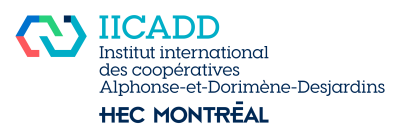
November 18, 2021
Elizabeth Eldridge has received the 2021 Award for the Encouragement of Research on Cooperatives and Mutuals, a new award that aims to encourage HEC Montréal students’ interest in the field of cooperatives and mutuals by encouraging high quality, inspiring and rigorous research.
Selected by a jury that included professors and researchers affiliated to the Alphonse and Dorimène Desjardins International Institute for Cooperatives, this project was carried out as part of her Master of Science in Global Supply Chain Management, and focuses on overcoming the poverty trap through improved input sourcing. This thesis has notably won the HEC Montréal’s Best Thesis Award 2020.
Summary of the thesis “Overcoming the Poverty Trap Through Improved Input Sourcing”
Despite vast research on the weaknesses of smallholder farmers in relation to the market as one cause of the endemic poverty they face, the issue persists. This demonstrates the need for a different perspective and approach. As such, my previous research focused on the input supply chain. Based on a study of supplier relationships and input sourcing activities among smallholder farmers in Tanzania, an unequal power dynamic was identified as the heart of the poverty trap. This unequal power dynamic perpetuates, and is perpetuated by, a lack of access to resources and quality agricultural inputs, a lack of information and support, as well as pressure to make trade-offs and decisions across input sourcing activities.
Our study found that key stakeholders must take collective and targeted action, on specified variables contributing to the poverty trap in order to reverse the cycle. Cooperative-type organizations represent an essential part of the solution given their role within the input supply chain. We found that smallholders are encouraged to participate in these organizations so as to facilitate access to information, training, and quality inputs. However, challenges related to capital, knowledge, time, distance, and transport restrict their access and ability to participate. Further, involvement with cooperatives can become tricky given the potential risk of increased reliance on others (one of the variables making up the poverty trap) and it may not equalize the power imbalance that perpetuates the poverty trap.
Our research also revealed a potential solution; to create localized smallholder-run ‘buying groups’ (micro-cooperatives). This type of group would allow smallholders, within a close geographical radius, to pool resources to improve the buyer-supplier dynamic. We see the broad potential for micro-cooperatives to reduce reactive/ad hoc decision making, negative trade-offs and overall costs, while also increasing the chances of receiving quality inputs, and providing opportunity for incentives from suppliers, such as delivery options. When presented with this possible option, the below is the reply received:
“That’s a good idea, a very, very good idea” / “Buying as a group, is better because you get, first of all, the price is low and the quality is fantastic because the seller, they are too shy to cheat on the groups. Buying as a group is really better to solve the problem and you can get better quality and low price.” – Smallholder farmers from Kwaugoro village.
Despite this enthusiasm and the known opportunity for improved input sourcing and other benefits that come with membership to cooperative-type organizations, we found that the reality of the situation is such that the ability to participate remains out of reach for many smallholders. This led me to pursue additional research into this area.
Based on positive feedback from smallholders regarding micro-cooperatives my next research will seek to understand the conditions for success towards the establishment of these types of groups. I intend to conduct research into the various levels and types of cooperatives to understand what is provided to their membership, how it is achieved, and what the short and long-terms benefits are to members. Subsequently, I intend to overlay this information onto a smallholder demographic that does not actively engage in cooperative activities/organizations to understand the limitations and challenges they face and what the desired benefits are based on a spectrum of possible options. Based on this feedback, I will seek to understand how current cooperative processes can be scaled down to the level and ability of a smallholder micro-cooperative buying group: what should be included, how would membership work, and what conditions must be present for successful and sustainable implementation.
Download the supervised thesis (coming soon)
About the author, Elizabeth Eldridge
Elizabeth Eldridge joined the Canadian Armed Forces in 2006 and has since served as a Logistics Officer in the Royal Canadian Navy (RCN). She graduated from the Royal Military College of Canada in 2010 with a Bachelor of Arts in Business Administration (Honours) with a Minor in Psychology and has most recently completed her M.Sc. in Global Supply Chain Management from HEC Montreal in 2020. She has worked in a variety of logistics and supply chain related environments on both domestic and international operations, has served onboard Her Majesty’s Canadian Ships, has worked in a mentorship capacity with international partners, and now works as a policy and supply chain advisor within the RCN.
In her spare time, she actively participates in her community through volunteering, playing rugby, practicing Muay Thai, and performing with the RCMP Community Pipes and Drums band. Since completing her Master’s thesis, Elizabeth has discovered a new passion based on the topic of study and continues to pursue research in this area.
